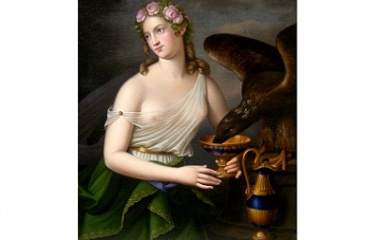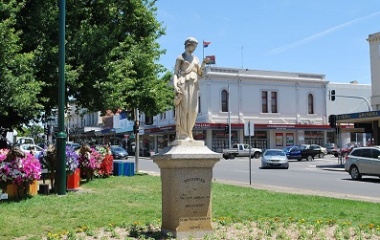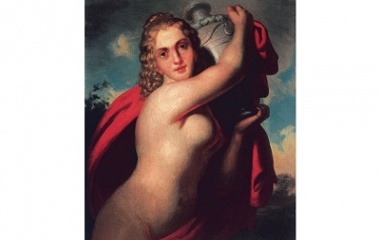- Pronunciation: HEE-bee
- Origin: Greece
- Abode: Mount Olympus
- Role: Goddess of eternal youth
- Cult Center: Athens
- Symbols: Wine cups, wings, the fountain of youth
- Parents: Zeus and Hera
- Husband: Heracles
- Children: Alexiares and Anicetus
Who Is Hebe?
In the tradition of ancient Greece, the female offspring in the home served any guests. Even the daughters of deities were not exempt from these duties. As the youngest daughter of Zeus and Hera, it was Hebe’s job to bring her golden chalice filled with nectar and ambrosia, the food and drink of the gods, and the sustenance of immortality. Also included in her duties were the tasks of readying her mother’s chariot, and drawing the bath for her brother Ares.
Despite her seemingly mundane duties, Hebe had advantages, too. She had the gift of eternal youth, and that was reflected in her adolescent figure and fresh-faced appearance. In later days, after Heracles was granted his divinity, she became his wife and they had twin sons together.
Origin
Hebe is known as the child of Zeus and Hera, but there is another myth that states Hera conceived her by eating wild lettuce while dining with the god Apollo. Either way, Hebe was often to be found serving up the nectar to the guest gods and goddesses of Zeus. That is, of course, until the day she tripped, had an embarrassing wardrobe malfunction, and her breasts fell out of her dress. Apollo fired her from her job as cup bearer and she was replaced by young Ganymede, a boy, and the lover and protégé of her father.
Family of Hebe
According the Odyssey, after the mortal life of Heracles ended, he ascended Mount Olympus, where he was awarded both divinity and the goddess of youth as his wife. These rewards were for his heroism during Gigantomachy, the war of the gods and the giants. But they had to get past Hera first, as she never cared much for Heracles, the son fathered by her husband and one of his many mistresses. In the end, Hera came around, and Hebe and Heracles were married. They went on to have twin boys, Alexiares and Anicetus.
Heracleidae
One of Hebe’s better known roles was her part in a tragedy written by Euripides in 430 BC and called Heracleidae, meaning Heracles children. The protagonist Iolaus is an old man and friend of the deceased and now divine Heracles. Iolaus calls upon Hebe to make him young again for a day so he can fight the enemy Eurystheus who tried to kill the Heracleidae.
A quote from the play translated by Ralph Gladstone from the English book Euripides: Four Tragedies. Ed. By David Grene and Richmond Lattimore:
To Zeus and Hebe, to get back his youth
For just a day, and take a full revenge.
Then came the most astounding thing of all!
Two stars shone on the yoke. They threw a dark
Cloud over the whole car, and people who
Should know say they were Hebe and your own
Great son. Then the haze lifted to disclose
A young fellow with husky biceps….
Iolaus was victorious!
Modern Influence
Hebe was a popular subject for painters and sculptors in Europe from the mid-1700s through the 1800s. Many works featuring her can be found in various museums and galleries around the world.
In the early 1800s there was a movement in the United States which prompted the construction of temperance fountains to discourage the drinking of alcoholic beverages. In New York City’s Tompkins Square Park, there still stands a statue of Hebe crafted by Bertel Thorwaldsen, a Dutch sculptor.
In Chicago’s Grant Park there is a bronze statue of Hebe and a fountain that was funded by the Joseph Rosenberg foundation in the mid-1800s. Rosenberg grew up in the Chicago area and worked as a newsboy. He could not convince the local storekeepers to spare him some water along his route. As a result, he decided if he were ever wealthy he would create a fountain where working boys could easily get a drink. It was sculpted in Germany by Franz Machtl.
As the quest for eternal youth continues to this day, replica statues of the goddess are a popular choice in private gardens and fountains.











cool
“but there is another myth that states Hera conceived her by eating wild lettuce while dining with the god Apollo.” I’ve been looking all over for any ancient source on that claim. Does anyone have one? I’d really like to retell that interesting bit of trivia; if I had a source for it. wikipedia in it’s article on Hera quotes “The Writing of Orpheus: Greek Myth in Cultural Context” – a modern source that might contain a more ancient one. Alas, there doesn’t seem to be a copy of that book in my entire country (at least not in any… Read more »